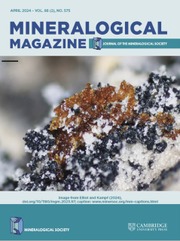Crossref Citations
This article has been cited by the following publications. This list is generated based on data provided by
Crossref.
Wood, Bernard J.
and
Nicholls, J.
1978.
The thermodynamic properties of reciprocal solid solutions.
Contributions to Mineralogy and Petrology,
Vol. 66,
Issue. 4,
p.
389.
Holland, T. J. B.
1979.
Experimental determination of the reaction paragonite=jadeite+kyanite+H2O, and internally consistent thermodynamic data for part of the system Na2O−Al2O3−SiO2−H2O, with applications to eclogites and blueschists.
Contributions to Mineralogy and Petrology,
Vol. 68,
Issue. 3,
p.
293.
Holland, T. J. B.
1979.
High Water Activities in the Generation of High Pressure Kyanite Eclogites of the Tauern Window, Austria.
The Journal of Geology,
Vol. 87,
Issue. 1,
p.
1.
Smith, David C.
Mottana, Annibale
and
Rossi, Giuseppe
1980.
Crystal-chemistry of a unique jadeite-rich acmite-poor omphacite from the Nybø eclogite pod, Sørpollen, Nordfjord, Norway.
Lithos,
Vol. 13,
Issue. 3,
p.
227.
Carpenter, Michael A.
1980.
Mechanisms of exsolution in sodic pyroxenes.
Contributions to Mineralogy and Petrology,
Vol. 71,
Issue. 3,
p.
289.
Sasaki, Satoshi
Matsumoto, Takeo
and
Sawada, Chikako
1981.
The influence of multiple diffraction on the space group determination of orthopyroxene, spodumene, low omphacite and pigeonite.
Physics and Chemistry of Minerals,
Vol. 7,
Issue. 6,
p.
260.
Carpenter, M. A.
and
Smith, D. C.
1981.
Solid solution and cation ordering limits in high-temperature sodic pyroxenes from the Nybö eclogite pod, Norway.
Mineralogical Magazine,
Vol. 44,
Issue. 333,
p.
37.
Brothers, R. N.
and
Yokoyama, K.
1982.
Comparison of the high-pressure schist belts of New Caledonia and Sanbagawa, Japan.
Contributions to Mineralogy and Petrology,
Vol. 79,
Issue. 2,
p.
219.
Carpenter, Michael A.
1982.
Time-temperature-transformation (TTT) analysis of cation disordering in omphacite.
Contributions to Mineralogy and Petrology,
Vol. 78,
Issue. 4,
p.
433.
Enami, Masaki
and
Tokonami, Masayasu
1984.
Coexisting sodic augite and omphacite in a Sanbagawa metamorphic rock, Japan.
Contributions to Mineralogy and Petrology,
Vol. 86,
Issue. 3,
p.
241.
Bocchio, Rosangela
Liborio, Giuseppe
and
Mottana, Annibale
1985.
Petrology of the amphibolitized eclogites of Gorduno, Lepontine Alps, Switzerland.
Chemical Geology,
Vol. 50,
Issue. 1-3,
p.
65.
MARUYAMA, S.
and
LIOU, J.G.
1987.
Clinopyroxene–a mineral telescoped through the processes of blueschist facies metamorphism.
Journal of Metamorphic Geology,
Vol. 5,
Issue. 4,
p.
529.
Ross, Charles R.
1988.
Statistical mechanical modeling of the kinetics of order-disorder in omphacitic pyroxenes.
Physics and Chemistry of Minerals,
Vol. 15,
Issue. 3,
p.
274.
Zhang, Qifang
Ma, Zhesheng
and
Shi, Nicheng
1999.
Determination of crystal structure of omphacite.
Chinese Science Bulletin,
Vol. 44,
Issue. 10,
p.
944.
Ulrich, Stanislav
and
Mainprice, David
2005.
Does cation ordering in omphacite influence development of lattice-preferred orientation?.
Journal of Structural Geology,
Vol. 27,
Issue. 3,
p.
419.
Burzo, E.
2006.
Inosilicates.
Vol. 27I4,
Issue. ,
p.
20.
ENAMI, Masaki
HUANG, Shuaimin
TSUBOI, Motohiro
and
WAKASUGI, Yuki
2020.
Petrological and mineralogical contrasts of basic lithologies between eclogite and non–eclogite units along the Kokuryo River of the Sanbagawa belt, Central Shikoku, Japan.
Journal of Mineralogical and Petrological Sciences,
Vol. 115,
Issue. 6,
p.
457.
Fukushima, Ryo
Tsujimori, Tatsuki
and
Miyajima, Nobuyoshi
2021.
Various antiphase domains in garnet-hosted omphacite in low-temperature eclogite: A FIB-TEM study on heterogeneous ordering processes.
American Mineralogist,
Vol. 106,
Issue. 10,
p.
1596.


